Encyclopedia
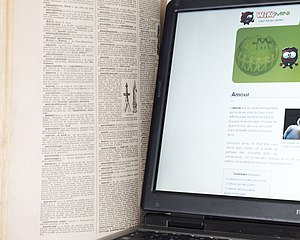
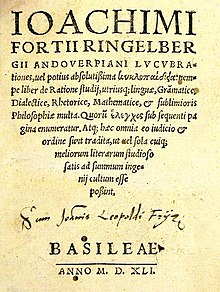
An encyclopedia (American English) or encyclopaedia (British English)[1] is a reference work or compendium providing summaries of knowledge, either general or special, to a particular field or discipline.[2][3] Encyclopedias are divided into articles or entries that are arranged alphabetically by article name[4] or by thematic categories, or else are hyperlinked and searchable.[5] Encyclopedia entries are longer and more detailed than those in most dictionaries.[4][6] Generally speaking, encyclopedia articles focus on factual information concerning the subject named in the article's title;[6] this is unlike dictionary entries, which focus on linguistic information about words, such as their etymology, meaning, pronunciation, use, and grammatical forms.[6][7][8][9][10]
Encyclopedias have existed for around 2,000 years and have evolved considerably during that time as regards language (written in a major international or a vernacular language), size (few or many volumes), intent (presentation of a global or a limited range of knowledge), cultural perspective (authoritative, ideological, didactic, utilitarian), authorship (qualifications, style), readership (education level, background, interests, capabilities), and the technologies available for their production and distribution (hand-written manuscripts, small or large print runs, Internet). As a valued source of reliable information compiled by experts, printed versions found a prominent place in
The appearance of digital and open-source versions in the 21st century, such as Wikipedia, has vastly expanded the accessibility, authorship, readership, and variety of encyclopedia entries.[11]
Etymology
Indeed, the purpose of an encyclopedia is to collect knowledge disseminated around the globe; to set forth its general system to the men with whom we live, and transmit it to those who will come after us, so that the work of preceding centuries will not become useless to the centuries to come; and so that our offspring, becoming better instructed, will at the same time become more virtuous and happy, and that we should not die without having rendered a service to the human race in the future years to come.
The word
Characteristics
This section possibly contains original research. (April 2022) |
The modern encyclopedia evolved from the
To address those needs, an encyclopedia article is typically not limited to simple definitions, and is not limited to defining an individual word, but provides a more extensive meaning for a subject or
Wikipedia co-founder Jimmy Wales has said that the goal of an encyclopedia should be to provide "the sum of all human knowledge, but sum meaning summary."[20]
In addition, sometimes books or reading lists are compiled from a compendium of articles (either wholly or partially taken) from a specific encyclopedia.
Four major elements
Four major elements define an encyclopedia: its subject matter, its scope, its method of organization, and its method of production:
- Encyclopedias can be general, containing articles on topics in every field (the English-language Encyclopædia Britannica and German Brockhaus are well-known examples).[3] General encyclopedias may contain guides on how to do a variety of things, as well as embedded dictionaries and gazetteers.[citation needed] There are also encyclopedias that cover a wide variety of topics from a particular cultural, ethnic, or national perspective, such as the Great Soviet Encyclopedia or Encyclopaedia Judaica.
- Works of encyclopedic scope aim to convey the important accumulated knowledge for their subject domain, such as an encyclopedia of medicine, philosophy or law. Works vary in the breadth of material and the depth of discussion, depending on the target audience.
- Some systematic methods of organization is essential to making an encyclopedia usable for reference. There have historically been two main methods of organizing printed encyclopedias: the on the title page of the 18th century Encyclopédie suggests the importance of the structure of an encyclopedia: "What grace may be added to commonplace matters by the power of order and connection."
- As modern multimedia and the information age have evolved, new methods have emerged for the collection, verification, summation, and presentation of information of all kinds. Projects such as Everything2, Encarta, h2g2, and Wikipedia are examples of new forms of the encyclopedia as information retrieval becomes simpler. The method of production for an encyclopedia historically has been supported in both for-profit and non-profit contexts, such was the case of the Great Soviet Encyclopedia mentioned above which was entirely state-sponsored, while the Britannica was supported as a for-profit institution.
Encyclopedic dictionaries
Some works entitled "dictionaries" are similar to encyclopedias, especially those concerned with a particular field (such as the Dictionary of the Middle Ages, the Dictionary of American Naval Fighting Ships, and Black's Law Dictionary). The Macquarie Dictionary, Australia's national dictionary, became an encyclopedic dictionary after its first edition in recognition of the use of proper nouns in common communication, and the words derived from such proper nouns.
Differences between encyclopedias and dictionaries
There are some broad differences between encyclopedias and dictionaries. Most noticeably, encyclopedia articles are longer, fuller and more thorough than entries in most general-purpose dictionaries.[4][21] There are differences in content as well. Generally speaking, dictionaries provide linguistic information about words themselves, while encyclopedias focus more on the things for which those words stand.[7][8][9][10] Thus, while dictionary entries are inextricably fixed to the word described, encyclopedia articles can be given a different entry name. As such, dictionary entries are not fully translatable into other languages, but encyclopedia articles can be.[7]
In practice, however, the distinction is not concrete, as there is no clear-cut difference between factual, "encyclopedic" information and linguistic information such as appear in dictionaries.[9][21][22] Thus encyclopedias may contain material that is also found in dictionaries, and vice versa.[22] In particular, dictionary entries often contain factual information about the thing named by the word.[21][22]
Pre-modern encyclopedias
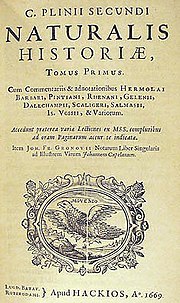
The earliest encyclopedic work to have survived to modern times is the
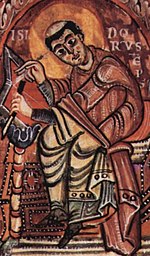
The Spanish scholar
.Another Christian encyclopedia was the Institutiones divinarum et saecularium litterarum of Cassiodorus (543–560) dedicated to the Christian divinity and the seven liberal arts.[24][6] The encyclopedia of Suda, a massive 10th-century Byzantine encyclopedia, had 30,000 entries, many drawing from ancient sources that have since been lost, and often derived from medieval Christian compilers. The text was arranged alphabetically with some slight deviations from common vowel order and placed in the Greek alphabet.[24]
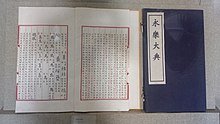
From India, the
The enormous encyclopedic work in China of the
There were many great encyclopedists throughout Chinese history, including the scientist and statesman
Printed encyclopedias
Before the advent of the printing press, encyclopedic works were all hand-copied and thus rarely available, beyond wealthy patrons or monastic men of learning: they were expensive, and usually written for those extending knowledge rather than those using it. During the
Financial, commercial, legal, and intellectual factors changed the size of encyclopedias. Middle classes had more time to read and encyclopedias helped them to learn more. Publishers wanted to increase their output so some countries like Germany started selling books missing alphabetical sections, to publish faster. Also, publishers could not afford all the resources by themselves, so multiple publishers would come together with their resources to create better encyclopedias. Later, rivalry grew, causing copyright to occur due to weak underdeveloped laws. John Harris is often credited with introducing the now-familiar alphabetic format in 1704 with his English Lexicon Technicum: Or, A Universal English Dictionary of Arts and Sciences: Explaining not only the Terms of Art, but the Arts Themselves – to give its full title. Organized alphabetically, its content does indeed contain an explanation not merely of the terms used in the arts and sciences, but of the arts and sciences themselves. Sir Isaac Newton contributed his only published work on chemistry to the second volume of 1710.
Encyclopédie
Encyclopédie, ou dictionnaire raisonné des sciences, des arts et des métiers (French for 'Encyclopedia, or a Systematic Dictionary of the Sciences, Arts and Crafts'),[29] better known as Encyclopédie (French: [ɑ̃siklɔpedi]), was a general encyclopedia published in France between 1751 and 1772, with later supplements, revised editions, and translations. It had many writers, known as the Encyclopédistes. It was edited by Denis Diderot and, until 1759, co-edited by Jean le Rond d'Alembert.[30]
The Encyclopédie is most famous for representing the thought of the Enlightenment. According to Denis Diderot in the article "Encyclopédie", the Encyclopédies aim was "to change the way people think" and for people to be able to inform themselves and to know things.[31] He and the other contributors advocated for the secularization of learning away from the Jesuits.[32] Diderot wanted to incorporate all of the world's knowledge into the Encyclopédie and hoped that the text could disseminate all this information to the public and future generations.[33] Thus, it is an example of democratization of knowledge.
It was also the first encyclopedia to include contributions from many named contributors, and it was the first general encyclopedia to describe theEncyclopædia Britannica
The Encyclopædia Britannica (
Printed for 244 years, the Britannica was the longest-running in-print encyclopaedia in the English language. It was first published between 1768 and 1771 in the Scottish capital of Edinburgh, as three volumes. The encyclopaedia grew in size: the second edition was 10 volumes,[37] and by its fourth edition (1801–1810) it had expanded to 20 volumes.[38] Its rising stature as a scholarly work helped recruit eminent contributors, and the 9th (1875–1889) and 11th editions (1911) are landmark encyclopaedias for scholarship and literary style. Starting with the 11th edition and following its acquisition by an American firm, the Britannica shortened and simplified articles to broaden its appeal to the North American market.
In 1933, the Britannica became the first encyclopaedia to adopt "continuous revision", in which the encyclopaedia is continually reprinted, with every article updated on a schedule.[
In March 2012, it announced it would no longer publish printed editions and would focus instead on the online version.[41][43] Britannica has been assessed to be politically closer to the centre of the US political spectrum than Wikipedia.[44]
The 15th edition (1974–2010) has a three-part structure: a 12-volume Micropædia of short articles (generally fewer than 750 words), a 17-volumeBrockhaus Enzyklopädie
The Brockhaus Enzyklopädie (German for Brockhaus Encyclopedia) is a German-language encyclopedia which until 2009 was published by the F. A. Brockhaus printing house.
The first edition originated in the Conversations-Lexikon published by Renatus Gotthelf Löbel and Franke in Leipzig 1796–1808. Renamed Der Große Brockhaus in 1928 and Brockhaus Enzyklopädie from 1966, the current[update] 21st thirty-volume edition contains about 300,000 entries on about 24,000 pages, with about 40,000 maps, graphics and tables. It is the largest German-language printed encyclopedia in the 21st century.
In February 2008, F. A. Brockhaus announced the changeover to anEncyclopedias in the United States
In the United States, the 1950s and 1960s saw the introduction of several large popular encyclopedias, often sold on installment plans. The best known of these were
Digital encyclopedias
Physical media
By the late 20th century, encyclopedias were being published on
CD-ROM encyclopedias were usually a macOS or Microsoft Windows (3.0, 3.1 or 95/98) application on a CD-ROM disc. The user would execute the encyclopedia's software program to see a menu that allowed them to start browsing the encyclopedia's articles, and most encyclopedias also supported a way to search the contents of the encyclopedia. The article text was usually hyperlinked and also included photographs, audio clips (for example in articles about historical speeches or musical instruments), and video clips. In the CD-ROM age, the video clips had usually a low resolution, often 160x120 or 320x240 pixels. Such encyclopedias which made use of photos, audio and video were also called multimedia encyclopedias.
Microsoft's Encarta, launched in 1993, was a landmark example as it had no printed equivalent. Articles were supplemented with video and audio files as well as numerous high-quality images. After sixteen years, Microsoft discontinued the Encarta line of products in 2009.[47] Other examples of CD-ROM encyclopedia are Grolier Multimedia Encyclopedia and Britannica.
Digital encyclopedias enable "Encyclopedia Services" (such as
Online
Free encyclopedias

The concept of a free encyclopedia began with the
It was not until Nupedia and later Wikipedia that a stable free encyclopedia project was able to be established on the Internet.
The English Wikipedia, which was started in 2001, became the world's largest encyclopedia in 2004 at the 300,000 article stage.[49] By late 2005, Wikipedia had produced over two million articles in more than 80 languages with content licensed under the copyleft GNU Free Documentation License. As of August 2009,[update] Wikipedia had over 3 million articles in English and well over 10 million combined articles in over 250 languages. Today, Wikipedia has 6,815,704 articles in English, over 60 million combined articles in over 300 languages, and over 250 million combined pages including project and discussion pages.[50]
Since 2002, other free encyclopedias appeared, including
See also
Notes
- )
- ^ "Encyclopedia". Archived from the original on August 3, 2007. Glossary of Library Terms. Riverside City College, Digital Library/Learning Resource Center. Retrieved on: November 17, 2007.
- ^ a b "What are Reference Resources?". Eastern Illinois University. Archived from the original on November 22, 2022. Retrieved December 17, 2022.
- ^ ISBN 978-0-415-14143-7. Archived from the originalon January 14, 2021. Retrieved July 27, 2010.
- ^ a b "Encyclopedia". Merriam-Webster. Archived from the original on September 29, 2022. Retrieved December 17, 2022.
- ^ a b c d e f g h Bocco, Diana (August 30, 2022). "What is an Encyclopedia?". Language Humanities. Archived from the original on September 27, 2022. Retrieved January 24, 2023.
- ^ ISBN 0-19-829951-6
- ^ a b "Encyclopaedia". Encyclopædia Britannica. Archived from the original on December 16, 2010. Retrieved July 27, 2010.
An English lexicographer, H.W. Fowler, wrote in the preface to the first edition (1911) of The Concise Oxford Dictionary of Current English language that a dictionary is concerned with the uses of words and phrases and with giving information about the things for which they stand only so far as current use of the words depends upon knowledge of those things. The emphasis in an encyclopedia is much more on the nature of the things for which the words and phrases stand.
- ^ ISBN 978-0-415-14143-7. Archived from the originalon January 14, 2021. Retrieved July 27, 2010.
In contrast with linguistic information, encyclopedia material is more concerned with the description of objective realities than the words or phrases that refer to them. In practice, however, there is no hard and fast boundary between factual and lexical knowledge.
- ^ ISBN 978-0-415-14143-7. Archived from the originalon April 15, 2021. Retrieved August 17, 2010.
An 'encyclopedia' (encyclopaedia) usually gives more information than a dictionary; it explains not only the words but also the things and concepts referred to by the words.
- ISBN 978-0-415-78265-4.
- ^ Denis Diderot; Jean le Rond d'Alembert. Encyclopédie. Archived April 29, 2011, at the Wayback Machine. University of Michigan Library: Scholarly Publishing Office and DLXS. Retrieved on: November 17, 2007.
- ^ Ἐγκύκλιος παιδεία Archived February 9, 2021, at the Wayback Machine, Quintilian, Institutio Oratoria, 1.10.1, at Perseus Project
- ^ ἐγκύκλιος Archived March 8, 2021, at the Wayback Machine, Henry George Liddell, Robert Scott, A Greek–English Lexicon, at Perseus Project
- ^ παιδεία Archived March 8, 2021, at the Wayback Machine, Henry George Liddell, Robert Scott, A Greek–English Lexicon, at Perseus Project
- ^ According to some accounts, such as the American Heritage Dictionary Archived August 19, 2017, at the Wayback Machine, copyists of Latin manuscripts took this phrase to be a single Greek word, ἐγκυκλοπαιδεία enkyklopaedia.
- ISBN 9780226260709.
- ISBN 978-1-107-03823-3.
- ISBN 978-0-521-15292-1
- ^ Fridman, Lex (June 18, 2023). "Transcript for Jimmy Wales: Wikipedia | Lex Fridman Podcast #385". Lex Fridman. Retrieved June 18, 2023.
- ^ ISBN 978-0-415-14143-7. Archivedfrom the original on January 14, 2021. Retrieved July 27, 2010.
Usually these two aspects overlap – encyclopedic information being difficult to distinguish from linguistic information – and dictionaries attempt to capture both in the explanation of a meaning ...
- ^ ISBN 978-0-19-829951-6.
The two types, as we have seen, are not easily differentiated; encyclopedias contain information that is also to be found in dictionaries, and vice versa.
- ^ a b Grossman, Ron (December 7, 2017). "Long before Google, there was the encyclopedia". Chicago Tribune. Archived from the original on October 22, 2022. Retrieved December 9, 2022.
- ^ a b c d "History of Encyclopaedias". Britannica. Archived from the original on October 6, 2022. Retrieved December 9, 2022.
- ^ a b c Nobel, Justin (December 9, 2015). "Encyclopedias Are Time Capsules". The Atlantic. Archived from the original on December 5, 2022. Retrieved December 17, 2022.
- ^ MacFarlane 1980:4; MacFarlane translates Etymologiae viii.
- ^ Braulio, Elogium of Isidore appended to Isidore's De viris illustribus, heavily indebted itself to Jerome.
- ^ Needham, Volume 5, Part 7, 102.
- ^ Ian Buchanan, A Dictionary of Critical Theory, Oxford University Press, 2010, p. 151.
- ^ "Encyclopédie | French reference work". Encyclopædia Britannica. Retrieved March 15, 2020.
- ^ Denis Diderot as quoted in Hunt, p. 611
- ^ University of the State of New York (1893). Annual Report of the Regents, Volume 106. p. 266.
- ^ Denis Diderot as quoted in Kramnick, p. 17.
- ^ Lyons, M. (2013). Books: a living history. London: Thames & Hudson.
- ^ Robert Audi, Diderot, Denis" entry in The Cambridge Dictionary of Philosophy, (Cambridge University Press, 2015)
- ^ Bosman, Julie (March 13, 2012). "After 244 Years, Encyclopædia Britannica Stops the Presses". The New York Times. Archived from the original on March 14, 2012. Retrieved March 13, 2012.
- ^ "History of Encyclopædia Britannica and Britannica Online". Encyclopædia Britannica, Inc. Archived from the original on October 20, 2006. Retrieved May 31, 2019.
- ^ "History of Encyclopædia Britannica and Britannica.com". Britannica.com Corporate Site. Archived from the original on June 9, 2001. Retrieved May 31, 2019.
{{cite web}}: CS1 maint: unfit URL (link) - ISSN 1059-1028. Retrieved July 15, 2023.
- ^ Cooke, Richard (February 17, 2020). "Wikipedia Is the Last Best Place on the Internet". Wired. Retrieved March 30, 2021.
- ^ a b Bosman, Julie (March 13, 2012). "After 244 Years, Encyclopaedia Britannica Stops the Presses". The New York Times. Retrieved June 7, 2023.
- ^ McArdle, Megan (March 15, 2012). "Encyclopaedia Britannica Goes Out of Print, Won't Be Missed". The Atlantic. Retrieved June 7, 2023.
- ^ Kearney, Christine (March 14, 2012). "Encyclopaedia Britannica: After 244 years in print, only digital copies sold". The Christian Science Monitor. Reuters. Archived from the original on May 31, 2019. Retrieved May 31, 2019.
- ^ Knowledge, HBS Working. "Wikipedia Or Encyclopædia Britannica: Which Has More Bias?". Forbes. Retrieved July 25, 2023.
- ^ Onion, Rebecca (June 3, 2016). "How Two Artists Turn Old Encyclopedias Into Beautiful, Melancholy Art". Slate. Archived from the original on September 23, 2019. Retrieved September 23, 2019.
- ISBN 0-89774-744-5.
- ^ Important Notice: MSN Encarta to be Discontinued. MSN Encarta. Archived from the original on October 27, 2009.
- ^ "Encyclopedia Service Are About To Become A Huge Market". www.stillwatercurrent.com. Archived from the original on September 27, 2021. Retrieved September 27, 2021.
- ^ "Wikipedia Passes 300,000 Articles making it the worlds largest encyclopedia" Archived September 27, 2007, at the Wayback Machine, Linux Reviews, 2004 Julich y 7.
- ^ "List of Wikipedias - Meta". meta.wikimedia.org. Retrieved August 20, 2023.
- ISBN 978-0-7864-7356-4.
References
- "encyclopedia". Online Etymology Dictionary. Archived from the original on March 8, 2021. Retrieved May 13, 2020.
- "Encyclopaedia". Encyclopædia Britannica. Archived from the original on December 16, 2010. Retrieved July 27, 2010.
- Béjoint, Henri (2000). Modern Lexicography. Oxford University Press. ISBN 978-0-19-829951-6.
- C. Codoner, S. Louis, M. Paulmier-Foucart, D. Hüe, M. Salvat, A. Llinares, L'Encyclopédisme. Actes du Colloque de Caen, A. Becq (dir.), Paris, 1991.
- Bergenholtz, H.; Nielsen, S.; Tarp, S., eds. (2009). Lexicography at a Crossroads: Dictionaries and Encyclopedias Today, Lexicographical Tools Tomorrow. Peter Lang. ISBN 978-3-03911-799-4.
- Blom, Phillip (2004). Enlightening the World: Encyclopédie, the Book that Changed the Course of History. New York; Basingstoke: Palgrave Macmillan. OCLC 57669780.
- Collison, Robert Lewis (1966). Encyclopaedias: Their History Throughout the Ages (2nd ed.). New York, London: Hafner. OCLC 220101699.
- Cowie, Anthony Paul (2009). The Oxford History of English Lexicography, Volume I. Oxford University Press. ISBN 978-0-415-14143-7. Archivedfrom the original on April 15, 2021. Retrieved August 17, 2010.
- Darnton, Robert (1979). The business of enlightenment: a publishing history of the Encyclopédie, 1775–1800. Cambridge: Belknap Press. ISBN 978-0-674-08785-9.
- Hartmann, R. R. K.; James, Gregory (1998). Dictionary of Lexicography. Routledge. ISBN 978-0-415-14143-7. Archivedfrom the original on January 14, 2021. Retrieved July 27, 2010.
- Kafker, Frank A., ed. (1981). Notable encyclopedias of the seventeenth and eighteenth centuries: nine predecessors of the Encyclopédie. Oxford: Voltaire Foundation. OCLC 10645788.
- Kafker, Frank A., ed. (1994). Notable encyclopedias of the late eighteenth century: eleven successors of the Encyclopédie. Oxford: Voltaire Foundation. OCLC 30787125.
- Needham, Joseph (1986). "Part 7, Military Technology; the Gunpowder Epic". Science and Civilization in China. Vol. 5 – Chemistry and Chemical Technology. Taipei: Caves Books Ltd. OCLC 59245877.
- JSTOR 4486062. Archived from the originalon April 25, 2010.
- Ioannides, Marinos (2006). The e-volution of information communication technology in cultural heritage: where hi-tech touches the past: risks and challenges for the 21st century. Budapest: Archaeolingua. OCLC 218599120.
- Walsh, S. Padraig (1968). Anglo-American general encyclopedias: a historical bibliography, 1703–1967. New York: Bowker. p. 270. OCLC 577541.
- Yeo, Richard R. (2001). Encyclopaedic visions: scientific dictionaries and enlightenment culture. Cambridge, New York: Cambridge University Press. from the original on April 16, 2014. Retrieved April 15, 2014.
External links
- Encyclopaedia and Hypertext
- Internet Accuracy Project – Biographical errors in encyclopedias and almanacs
- "Encyclopedia" – Diderot's article on the Encyclopedia from the original Encyclopédie.
- De expetendis et fugiendis rebus – First Renaissance encyclopedia
- Errors and inconsistencies in several printed reference books and encyclopedias; Archived July 18, 2001, at the Wayback Machine
- "Digital encyclopedias put the world at your fingertips" – CNET article
- Encyclopedias online University of Wisconsin – Stout listing by category
- Chambers' Cyclopaedia, 1728, with the 1753 supplement
- Encyclopædia Americana, 1851, Francis Lieber ed. (Boston: Mussey & Co.) at the University of Michigan Making of America site
- Encyclopædia Britannica, articles and illustrations from 9th ed., 1875–89, and 10th ed., 1902–03.
